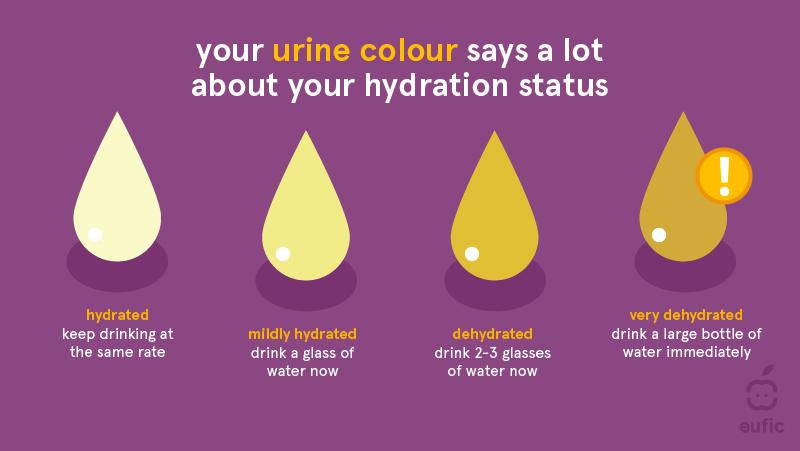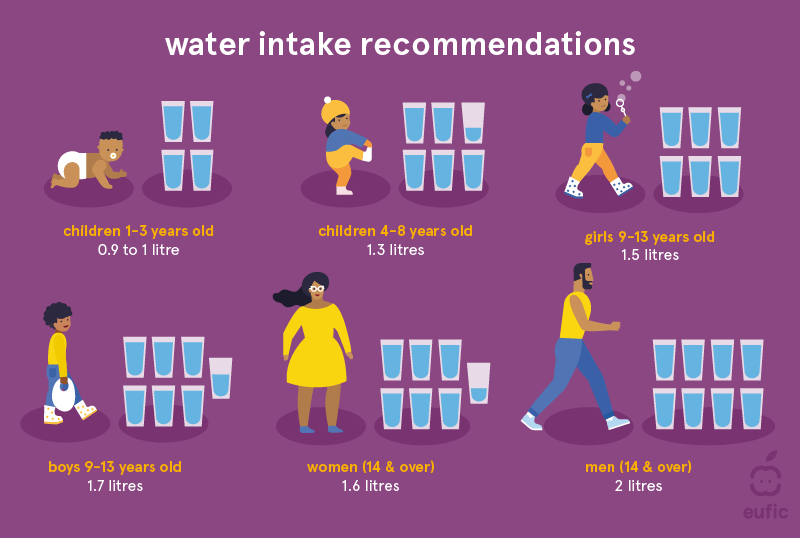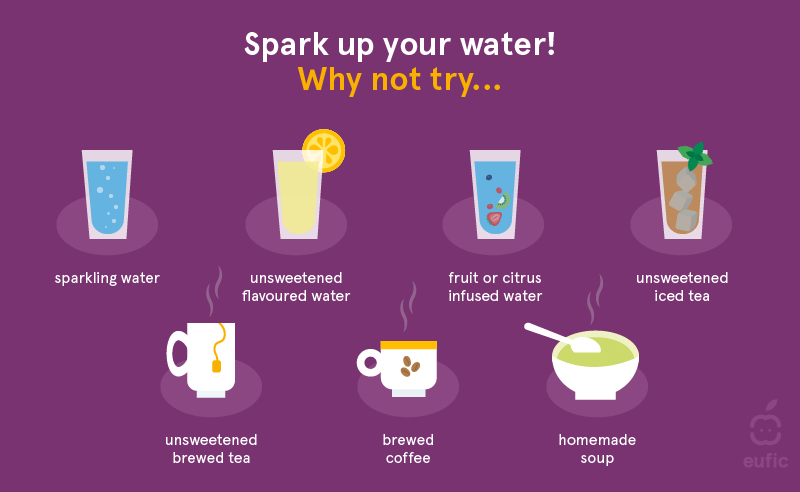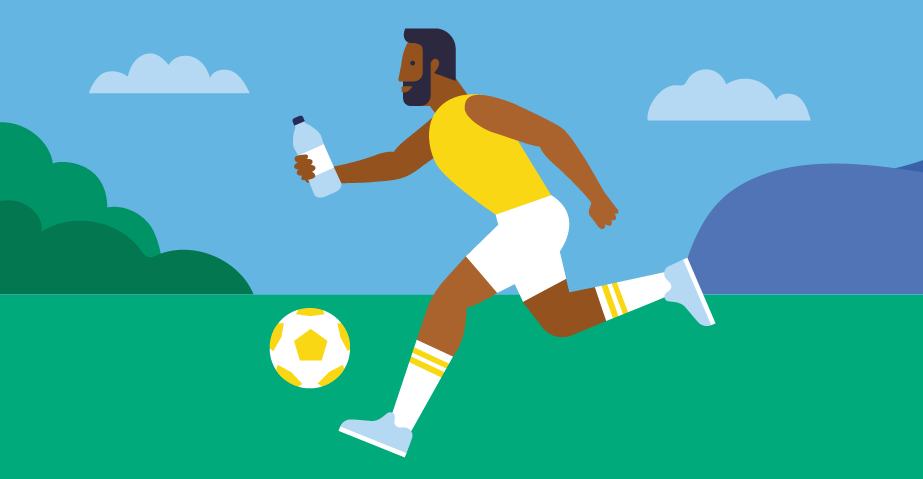How much water should you drink per day?
Last Updated : 26 March 2020We can go for 50 days without food, but only two to three without water. Water is essential to the human body and we need about 2.5 litres of water a day.1 Most of this will come from fluids but some from solid or liquid food.
The total of 2.5 litres per day is a rough estimate and depends on several factors:
- Age
- Sex
- Weight
- Height
- Level of physical activity
- Temperature & climate
Water in our body
The water content in our body diminishes as we age. Newborns have the most with 75% and the elderly the least with 55%. Adults have on average 60% of water in their body.1,2
So where exactly in the body is the water stored? One third is in our blood and between our cells, while the majority, two thirds, is in our cells.
If your body gets dehydrated, many bodily functions can be affected, because water regulates:2
- Body temperature
- Hormone regulation
- Energy expenditure stimulation
- Thickness of blood
- Skin moisture
- Cell longevity
- Positive digestion
- Cushion function for the spinal cord, brain and eyes
- Waste product elimination
Our body loses water constantly through breath, sweat, urine and faeces.1 We lose even more water if we are ill, through vomiting and diarrhoea, so this increases our risk of dehydration.
How thirsty are you?
Because water is so important for our survival our body has a very good way of letting us know if we are becoming dehydrated. Thirst. If you feel thirsty, you know you need to drink.
Have you ever wondered how your body knows when you’re dehydrated? In our brain, receptors measure blood consistency and react if it gets thinner. As a result, a hormone called vasopressin gets released into our system. Vasopressin makes sure we keep more water in our body, by retaining water in our kidneys and igniting the feeling of thirst.1

If you want to double check your hydration status, a simple way is to look at the colour of your urine. Light yellow means you’re hydrated, but if it turns dark yellow you are dehydrated.
Dehydration, which happens when the body does not have enough water, is very dangerous. If we lose just 1% of our body water, we have decreased power for exercise, decreased temperature control in our body and less appetite. At 5% water loss, our mental performance decreases; with trouble concentrating, irritability, sleepiness, and often headaches. If we lose more than 8% of our water, we could actually die.1
Have you ever been so concentrated or busy you simply forgot to drink? Symptoms that might show up are: 1
- Dry, sticky mouth
- Muscle cramps
- Headache
- Dry skin
- Tiredness
- Loss of concentration
Stay hydrated
The European Food Safety Authority (EFSA) proposes the following guidelines for healthy total water intake.1
|
Group |
Recommended total water intake (per day) |
|
Infants (0-6 months old) |
100 - 190 ml per kg bodyweight, from breastmilk |
|
Infants (6-12 months old) |
0.8 - 1.0 litres |
|
Children (1-2 years old) |
1.1 – 1.2 litres |
|
Children (2-3 years old) |
1.3 litres |
|
Children (4-8 years old) |
1.6 litres |
|
Boys (9-13 years old) |
2.1 litres |
|
Girls (9-13 years old) |
1.9 litres |
|
Adult men (older than 14 years) |
2.5 litres |
|
Adult women (older than 14 years) |
2.0 litres |
Drinking this much water seems like a lot but remember that these are recommendations for our overall water intake, which includes the water we take in through our food.
As a rule of thumb, 20-30% of the water we need comes from our food. Eating a balanced diet with a wide variety of fruit and vegetables can already help us stay hydrated.
The recommended intake of water we need to drink would look more like this:

Too much water
The ‘more is not always better’ rule does apply when it comes to water. You can get water intoxication, hyponatremia, from drinking too much. This is a condition of overhydration causing salt levels to lower in the blood and excessive water to move inside cells which may lead to lung congestion and loss of muscle cells.1 Therefore, it’s recommended to always add a bit of salt to your water when you have to drink an exceptional amount. For example, we need to drink a lot, especially when exercising in a hot climate and for long periods of time (e.g. long-distance cycling and marathons) as a lot of fluid is lost through sweat. Sweat loss also means salt loss, which can cause cramps and exhaustion. Therefore, it’s important to drink isotonic drinks, which contain sodium and correspond with the composition of our body fluids.1
Best sources of water
It’s easy to drink more fluids on a daily basis. Not only plain water but all sorts of drinks can keep you hydrated.

TIP: If you don’t like the taste of plain water there’re some ways you can make it more enjoyable. A refreshing way is to add either ice cubes, slices of lemon, cucumber, some mint or berries.
When we open the tap, we have drinking water at our disposal at any time. Water is essential to our lives, but we might take its presence for granted. Governmental authorities regulate the safety of water used for human consumption (e.g. as drinking water or in food production). The quality of the water depends on its source. For safety, tap water needs to be filtered multiple times, to bind dirt, and only a minimal amount of disinfectant (e.g. chlorine) can be added to kill any remaining microorganisms.
Make hydration easy
Some easy practical solutions can prevent dehydration. Always carry a refillable water bottle with you and challenge yourself to finish it by the end of the day. This makes sure you always have easy access to water and don’t need to buy plastic bottles. Also, make sure to have water near you when you are at work. To make drinking even easier (and more fun) you can use a reusable straw. Finally, there are certain apps that can help you keep track of your water intake and send you reminders to drink throughout the day.

